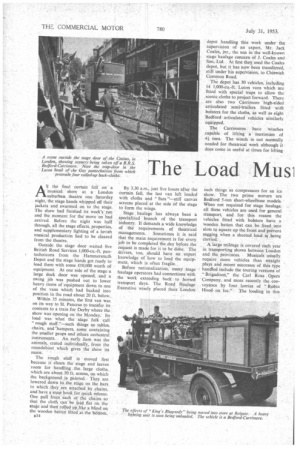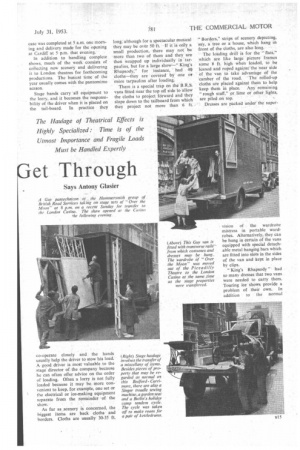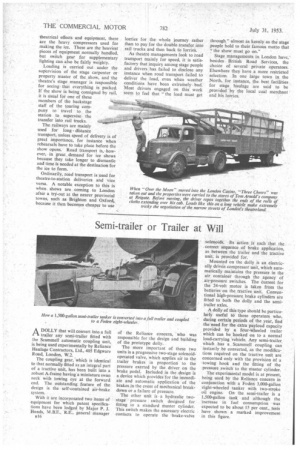The Load Musi
Page 48

Page 49

Page 50

If you've noticed an error in this article please click here to report it so we can fix it.
Get Through AS the final curtain fell on a musical show at a London suburban theatre one Saturday night, the stage hands whipped off their jackets and swarmed on to the stage. The show had finished its week's run and the moment for the move on had arrived. Before the night was half through, all the stage effects, properties, and supplementary lighting of a lavish musical production had to be cleared from the theatre.
Outside the stage door waited five British Road Services 1,000-cu.-ft. pantechnicons from the Hammersmith Depot and the stage hands got ready to load them with some £10,000 worth of equipment. At one side of the stage a large dock door was opened, and a swing jib was pushed out to lower heavy items of equipment down to one of the vans which had backed into position in the road about 20 ft. below.
Within 35 minutes, the first van was on its way to St. Pancras to transfer its contents to a train for Derby where the show was opening on the Monday. Its load was what the stage folk call "rough stuff "—such things as tables, chairs, and 'hampers, some containing the smaller props and others orchestral instruments. An early item was the animals, crated individually, from the roundabout which gives the show its name.
The rough stuff is moved first because it' clears the stage and leaves room for handling the large cloths, which are about 50 ft. across, on which the background 4 painted. They are lowered dawn to the stage on the bars to which they are attached by chains, and have a snap hook for quick release. One pull frees each of the chains so that the cloth can be laid ,flat on the stake and theo rolled. up like a blind on the wooden batten fitted at the Iicitiorn.
514 By 3.30 a.m., just five hours after the curtain fell, the last van left loaded with cloths and "fiats "—stiff canvas screens placed at the side of the stage to form the wings.
Stage haulage has always been a specialized branch of the transport industry. It demands a wide knowledge of the requirements of theatrical managements. Sometimes it is said that the main requirement is for every job to be completed the day before the request is made for it to be done. The drivers, too, should have an expert knowledge of how to load the equipment, which is often fragile.
Before nationalization, many .stage haulage operators had connections with the work extending back to horsed transport days. The Road Hanlage Executive wisely placed their London such things as compressors for an ice show. The two prime movers are Bedford 5-ton short-wheelbase models. When not required for stage haulage, all these vehicles are used for general transport, and for this reason the vehicles fitted with bolsters have a wooden batten that can be fixed into slots to square up the front and prevent sagging when a sheeted load is being carried.
A large mileage is covered each year in transporting shows between London and the provinces. Musicals usually require more vehicles than straight plays and recent successes of this type handled include the touring versions of "13rigadoon," the Carl Rosa Opera Company, and more recently the conveyance by four lorries of "Robin Hood on Ice." The loading in this
co-operate closely and the hands usually help the driver to stow his load. A good driver is most valuable to the stage director of the company because he can often offer advice on the order of loading. Often a lorry is not fully loaded because it may be. more convenient to keep, for example, one set or the electrical or ice-making equipment separate from the remainder of the show:
As far as „scenery is concerned, the biggest items are back cloths and borders. Cloths are usually 30-35 ft.
vision of the wardrobe mistress in portable wardrobes. Alternatively, they can be hung in certain of the vans equipped with special detachable metal hanging bars which are fitted into slots in the sides of the van and kept in place by clips.
"King's Rhapsody" had so many dresses that two vans were needed to carry them. Touring ice shows provide a problem of their own. In addition to the normal theatrical effects and equipment, there are the heavy compressors used for making the ice. These are the heaviest pieces of equipment normally handled, but switch gear for supplementary lighting can also be fairly weighty.
Loading is carried out under the supervision of the stage carpenter or property master of the show, and the theatre's stage manager is responsible for seeing that everything is packed. If the show is being consigned by rail, it is usual for one of these members of the backstage staff of the touring company to travel to the station to supervise the transfer into rail trucks.
The railways are mainly used for long distance transport, unless speed of delivery is of great importance, for instance when rehearsals have to take place before the show opens. Road transport is, chowever, in great demand for ice shows because they take longer to dismantle and time is needed at the destination for the ice to form.
Ordinarily, road transport is used for theatre-to-station deliveries and vice versa. A notable exception to this is when shows are coming to London after a try-out at the nearer provincial towns, such as Brighton and Oxford, because it then becomes cheaper to use lorries for the whole journey rather than to pay for the double transfer into rail trucks and then back to lorries.
As theatre managements look to road transport mainly for speed, it is satisfactory that inquiry among stage people and drivers has failed to disclose any instance when road transport failed to deliver the load, even when weather conditions have been extremely bad. Most drivers engaged on this work seem to feel that "the load must get through" almost as keenly as the stage people hold to their famous motto that ` the show must go on."
Stage managements in London have,' besides British Road Services, the choice of several private operators. Elsewhere they have a more restricted selection, In one large town in the North, for instance, the best facilities for stage haulage are said to be provided by the local coal merchant and his lorries.




















































































